The Whitney Plantation Tour undoubtedly offers a profound and immersive exploration of Louisiana’s complex history of slavery. Visitors can engage with restored historical structures, including slave cabins and a grand Spanish Creole main house, while an audio guide shares the personal narratives of those who were enslaved. With a focus on education and emotional impact, this tour provides a vital opportunity to confront the difficult legacies of the past. However, the true power of the experience lies in the way it challenges visitors to grapple with these weighty issues, leaving them with much to ponder long after the tour has ended.
Key Points
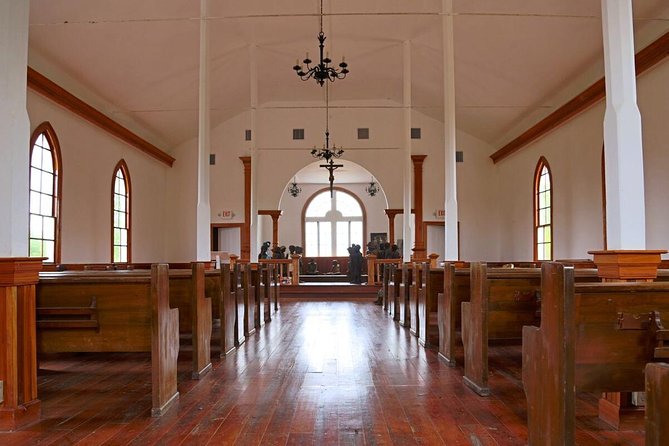
- This self-guided tour offers a deep exploration of the history of slavery in Louisiana, with a focus on the restored structures and slave cabins at the Whitney Plantation.
- Roundtrip transportation from a central meeting point in New Orleans is provided, simplifying access to the plantation and allowing visitors to fully enjoy the experience.
- The audio tour, featuring first-hand narratives from enslaved individuals, enhances the emotional impact and understanding of the realities of slavery through personal perspectives.
- The tour aims to leave a lasting impression on visitors by presenting a comprehensive and thoughtful examination of the dark chapter of slavery in American history.
- Accessibility considerations, such as the need for advanced arrangements for wheelchair users, ensure that the tour is as inclusive as possible for visitors of all abilities.
Tour Overview and Highlights
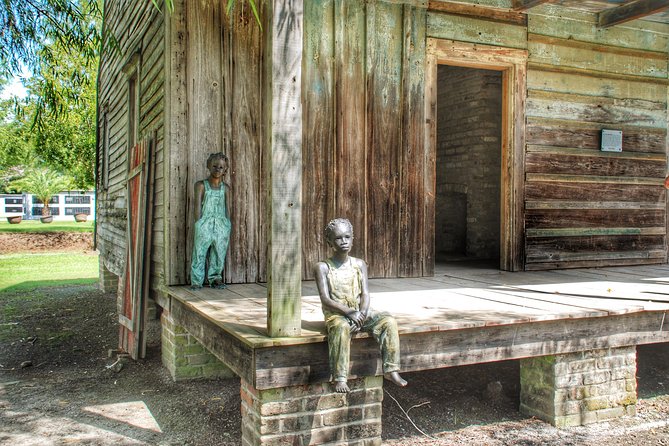
The Whitney Plantation Museum offers visitors a thought-provoking self-guided tour that delves into the complex history of slavery in Louisiana, providing an immersive experience through restored structures, historical slave cabins, and the Spanish Creole main house.
Guests can explore the plantation grounds at their own pace, spending around two hours discovering the site’s rich past.
An audio tour accessed through the Whitney Plantation app enhances the experience, featuring recorded narratives from enslaved people that bring their stories to life.
The tour offers a unique opportunity to gain a deeper understanding of the lives and hardships faced by those who were enslaved, leaving a lasting impression on all who visit.
You can also read our reviews of more tours and experiences in New Orleans.
Transportation and Meeting Details
Round-trip transportation to the Whitney Plantation Museum is provided from a central meeting point in New Orleans, allowing visitors convenient access to the historic site.
Travelers must arrive 15 minutes prior to the scheduled boarding time at the Gray Line Lighthouse Ticket Office located at 400 Toulouse Street.
Tour group sizes are limited to a maximum of 55 individuals, and arrangements for wheelchair accessibility must be made at least 48 hours in advance. This ensures a comfortable and accessible experience for all guests.
The transportation service eliminates the hassle of navigating to the plantation on your own, enabling you to focus on the meaningful insights and emotional journey the tour provides.
Exploring the Plantation Grounds
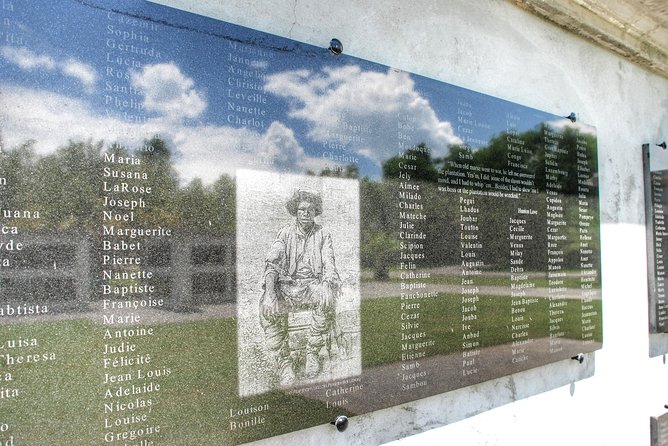
A self-guided tour of the Whitney Plantation Museum allows visitors to explore the restored structures and historical slave cabins that provide a profound and immersive understanding of the daily lives of enslaved individuals.
As you stroll through the grounds, you’ll encounter the Spanish Creole main house, which stands as a testament to the wealth and power of the plantation owners.
The audio tour, available through the Whitney Plantation app, offers recorded narratives from the enslaved people themselves, bringing their stories to life and humanizing the harsh realities they faced.
The self-paced nature of the tour enables visitors to linger and reflect on the weight of this history, leaving a lasting impact on their understanding of slavery in Louisiana.
Immersive Audio Tour Experience
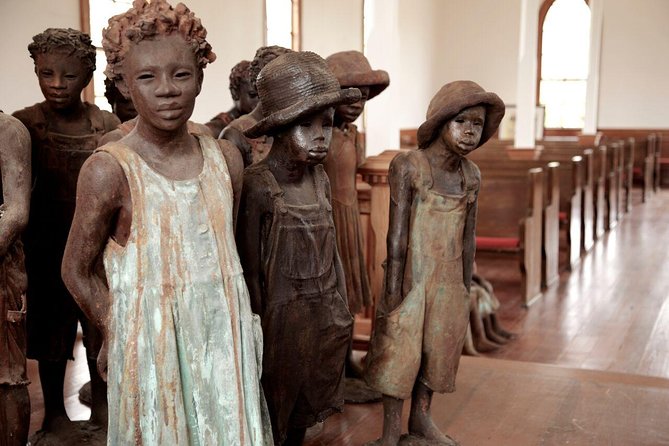
Visitors to the Whitney Plantation can enjoy the personal narratives of enslaved individuals through the museum’s audio tour, which brings their stories to life. The tour, available via the Whitney Plantation app, provides recorded accounts from the Federal Writers Project, offering a powerful, first-hand perspective into the lives of those who lived and worked on the plantation.
| Narrative Type | Recorded Perspective | Key Takeaway | Emotional Impact |
|---|---|---|---|
| Slave Auction | Enslaved Man | Separation of families | Heartbreaking |
| Field Work | Enslaved Woman | Backbreaking labor | Exhausting |
| Punishment | Enslaved Child | Inhumane treatment | Disturbing |
| Rebellion | Enslaved Leader | Resistance and resilience | Inspiring |
This immersive experience provides visitors with a deeper understanding of the realities of slavery, shedding light on the struggles and resilience of the enslaved people who lived on the plantation.
Historical Context and Education
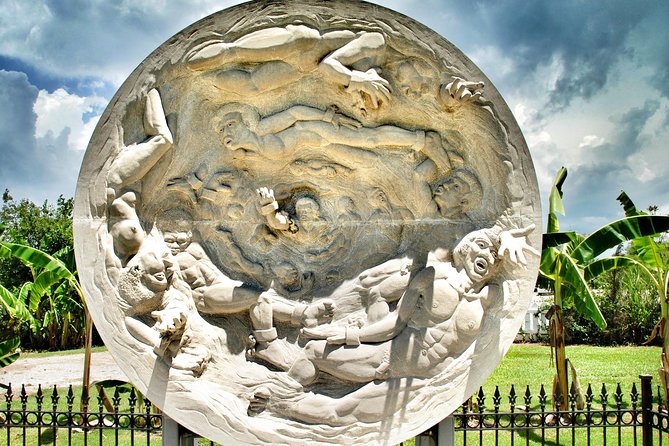
The Whitney Plantation, a National Historic Landmark founded over 260 years ago, provides visitors with a deeper understanding of the grim realities of slavery in the American South.
The museum’s exhibits thoughtfully detail the lived experiences of enslaved individuals, drawing upon first-person narratives recorded by the Federal Writers Project to shed light on their daily struggles and resilience.
Visitors learn about the harsh conditions, brutal treatment, and inhumane practices that defined the lives of those forced into bondage.
The tour offers a sobering yet essential exploration of this dark chapter in American history, challenging visitors to confront the realities of slavery and its lasting impact on individuals, families, and communities.
- Where to Stay in New Orleans Near the Superdome: Whitney Hotel Review
- Where to eat in New Orleans – On St. Claude Avenue & In The Marigny
- Exploring New Orleans: A Visit to Audubon Zoo
- Free Things to Do in New Orleans – Stroll Through Armstrong Park
- Things to Do in New Orleans – Visit the New Orleans Museum of Art (NOMA)
- Free things to do in New Orleans – Stroll down Magazine Street
Visitor Feedback and Reviews
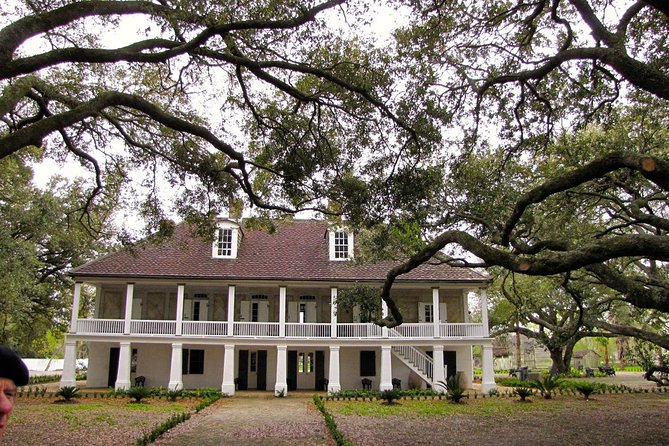
According to reviews, the Whitney Plantation tour has received overwhelmingly positive feedback, with many visitors praising the informative and emotionally impactful nature of the experience.
Reviewers have highlighted three key aspects that contribute to the tour’s success:
- The first-person narratives recorded by the Federal Writers Project, which provide a powerful and immersive glimpse into the lives of enslaved individuals.
- The thoughtful and nuanced way the museum exhibits detail the horrors of slavery in the American South, without sensationalizing or simplifying the complex realities.
- The self-paced exploration, which allows visitors to fully absorb the weight of the subject matter at their own pace, rather than being rushed through.
While some have expressed a desire for a more personal guide, the majority of visitors regard the Whitney Plantation tour as a must-see experience for those seeking to truly understand the legacy of slavery.
Accessibility and Special Arrangements

Though the plantation grounds offer self-paced exploration, accessibility presents certain challenges for visitors with limited mobility.
Some areas of the historic site are wheelchair-accessible, yet the main house remains largely inaccessible.
The tour team provides accommodations for those who require special arrangements. Visitors must make wheelchair-accessible requests at least 48 hours in advance to ensure the necessary arrangements are in place.
While the uneven terrain and restricted access to certain structures may pose difficulties, the Whitney Plantation’s commitment to inclusive experiences allows guests of all abilities to gain insight into the complex history of slavery.
Advance planning and open communication with the staff can help create a meaningful and accessible tour for all.
Booking and Cancelation Information
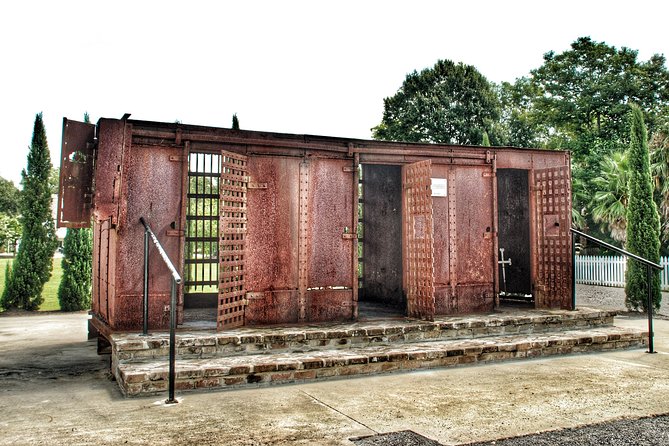
Booking the Whitney Plantation tour is a straightforward process, with available cancellation options to accommodate visitors’ needs. Guests can conveniently reserve their spots through the online platform, which also allows them to make any necessary wheelchair-accessible arrangements at least 48 hours prior to the tour.
On top of that, the tour provider offers a flexible cancellation policy, granting a full refund for any cancellations made up to 24 hours before the scheduled experience.
The key considerations for booking and cancellation include:
- Online reservation through the tour provider’s platform.
- Wheelchair accessibility requests must be made at least 48 hours in advance.
- Free cancellation available up to 24 hours before the tour.
This flexibility ensures a seamless booking experience and allows visitors to plan their schedules with ease.
Frequently Asked Questions
Is Photography Allowed on the Tour?
Photography is generally allowed on the plantation tour, enabling visitors to capture the historical structures and landscapes. However, flash photography may be prohibited in certain areas to preserve the integrity of the site.
What Is the Dress Code for the Tour?
The tour has a casual dress code, as visitors will be exploring outdoor plantation grounds. Comfortable, weather-appropriate attire and closed-toe shoes are recommended to navigate the uneven terrain comfortably during the self-guided experience.
Are There Any Age Restrictions for the Tour?
The tour generally does not have age restrictions, allowing visitors of all ages to participate. However, some content may be unsuitable for young children, so parental discretion is advised. Families should consider the child’s maturity and interest level when deciding on attendance.
Can I Bring My Own Food and Drinks?
No, visitors are not permitted to bring their own food or drinks on the Whitney Plantation tour. The tour does not provide any refreshments, so guests should plan accordingly before arriving. Food and drink purchases are not available on-site.
Are There Any Restrictions on the Audio Tour Devices?
The audio tour devices provided by the plantation typically have no significant restrictions, allowing visitors to explore the grounds at their own pace and gain insights through the recorded narratives. However, personal devices may have limited access to the content.
Recap
The Whitney Plantation Tour provides a powerful and immersive exploration of Louisiana’s complex history of slavery.
Through restored structures, personal narratives, and an educational focus, visitors confront the legacies of this difficult past in a meaningful way.
This tour offers a vital opportunity to engage with and reflect on the realities of slavery, leaving a profound impact on those who experience it.
More Tours in New Orleans
More Tour Reviews in New Orleans
Not for you? Here's more things to do in New Orleans we have recnetly reviewed
- New Orleans Yellow Fever Ghost Tour
- Crescent City Chronicles: The Heart of New Orleans
- New Orleans: Haunted Pub Crawl
- New Orleans: Daytime City Helicopter Tour
- New Orleans : Best of Ghost & Voodoo Experience Walking Tour
- New Orleans: Bayou Tour in Jean Lafitte National Park
- Glamorous Garden District Tour
- New Orleans: Garden District Food, Drinks & History Tour
- New Orleans Garden District Walking Tour Including Lafayette Cemetery No. 1
- New Orleans: City & Cemetery Tour by Air-Conditioned Minibus
- New Orleans: Tremé African American & Creole History Tour
- New Orleans: Traditional City and Estate Tour
